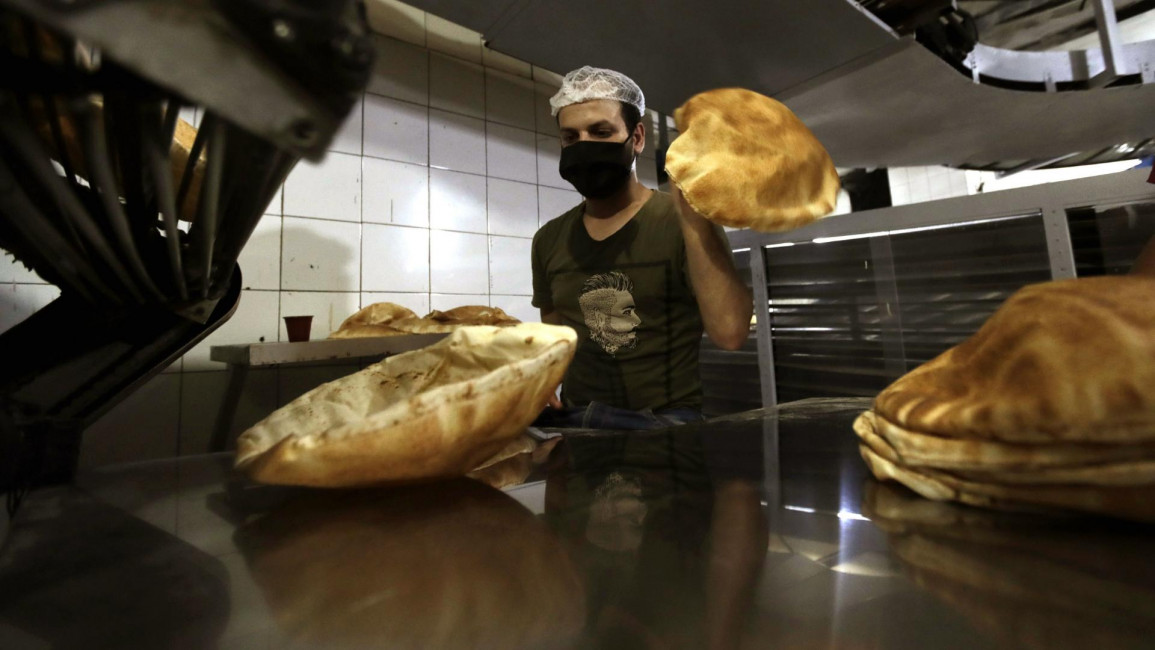Lebanon is not facing bread crisis after deadly explosion, economy minister says
Lebanon is not facing bread crisis after deadly explosion, economy minister says
Caretaker Economy Minister Raoul Nehme has said Beirut's port is open and ready to receive container ships following the deadly blast last week.
2 min read
Lebanon will soon have enough flour to last four months, Nehme said [Getty]
Lebanon is not facing a bread crisis following the deadly explosion last week that killed more than 200 people, caretaker Economy Minister Raoul Nehme asserted on Wednesday.
The damaged Beirut port where the blast erupted still has 12 working cranes able to accomodate container ships, Nehme added, meaning the country will be able to receive imports soon.
Observers had feared a bread crisis after the country's only grain silo took the brunt of the massive blast last Tuesday, destroying an estimated 120,000 metric tonnes of food stocks.
Lebanese authorities said last week that the country had enough flour to last six weeks.
In response, the United Nations' World Food Programme has said it will send 50,000 tonnes of wheat flour and three months of wheat reserves to the country.
Nehme told local media the country currently has 32,000 tonnes of flour in its reserves, just short of the 35,000 tonnes that make up its average monthly consumption.
Approximately 110,000 tonnes of flour has arrived or will arrive from foreign donors in the next two weeks, the caretaker economy minister said. Around 11,500 tonnes of flour arrived in the southern port city of Sidon on Tuesday.
The damaged Beirut port where the blast erupted still has 12 working cranes able to accomodate container ships, Nehme added, meaning the country will be able to receive imports soon.
Observers had feared a bread crisis after the country's only grain silo took the brunt of the massive blast last Tuesday, destroying an estimated 120,000 metric tonnes of food stocks.
Lebanese authorities said last week that the country had enough flour to last six weeks.
In response, the United Nations' World Food Programme has said it will send 50,000 tonnes of wheat flour and three months of wheat reserves to the country.
Nehme told local media the country currently has 32,000 tonnes of flour in its reserves, just short of the 35,000 tonnes that make up its average monthly consumption.
Approximately 110,000 tonnes of flour has arrived or will arrive from foreign donors in the next two weeks, the caretaker economy minister said. Around 11,500 tonnes of flour arrived in the southern port city of Sidon on Tuesday.
Read more: How bleak is Lebanon's future as city is destroyed, and economy plummets?
That total stock should be sufficient for four months, Nehme explained.
"There is no supply crisis or bread crisis," he said.
|
|
Prior to the deadly explosion, Lebanon was already suffering the worst economic crisis since its inception.
The currency collapse plunged up to 50 percent of the population into poverty, meaning bread was already scarce for many low-income Lebanese.
Last month, the government lifted bread subsidies, rising the price of a 900-gram loaf from 1,500 to 2,000 liras.
On Sunday, international donors pledged to provide Lebanon with 252.7 million euros ($297 million) in aid at a conference organised by France and the UN.
Observers had also raised concerns over the delivery of aid and goods to Lebanon - a country which is highly reliant on imports - following the port blast.
The much smaller port of Tripoli had been tasked with receiving container ships, while Turkey had offered its own southern port city Mersin as an alternative until the reconstruction of Beirut's port.
However, Nehme told reporters on Wednesday that the Beirut port can receive container ships as 12 out of 16 cranes remain operational.
Follow us on Facebook, Twitter and Instagram to stay connected



